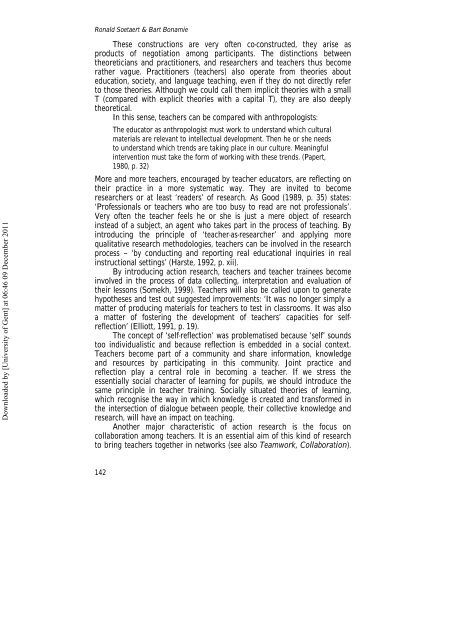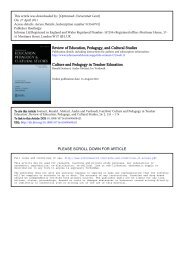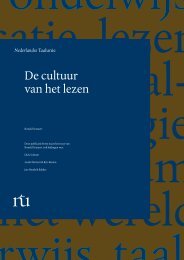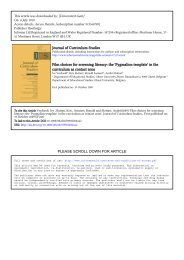a view informed by the problems of traditional literacy in a digital age
a view informed by the problems of traditional literacy in a digital age
a view informed by the problems of traditional literacy in a digital age
You also want an ePaper? Increase the reach of your titles
YUMPU automatically turns print PDFs into web optimized ePapers that Google loves.
Downloaded <strong>by</strong> [University <strong>of</strong> Gent] at 06:46 09 December 2011<br />
Ronald Soetaert & Bart Bonamie<br />
These constructions are very <strong>of</strong>ten co-constructed, <strong>the</strong>y arise as<br />
products <strong>of</strong> negotiation among participants. The dist<strong>in</strong>ctions between<br />
<strong>the</strong>oreticians and practitioners, and researchers and teachers thus become<br />
ra<strong>the</strong>r vague. Practitioners (teachers) also operate from <strong>the</strong>ories about<br />
education, society, and langu<strong>age</strong> teach<strong>in</strong>g, even if <strong>the</strong>y do not directly refer<br />
to those <strong>the</strong>ories. Although we could call <strong>the</strong>m implicit <strong>the</strong>ories with a small<br />
T (compared with explicit <strong>the</strong>ories with a capital T), <strong>the</strong>y are also deeply<br />
<strong>the</strong>oretical.<br />
In this sense, teachers can be compared with anthropologists:<br />
The educator as anthropologist must work to understand which cultural<br />
materials are relevant to <strong>in</strong>tellectual development. Then he or she needs<br />
to understand which trends are tak<strong>in</strong>g place <strong>in</strong> our culture. Mean<strong>in</strong>gful<br />
<strong>in</strong>tervention must take <strong>the</strong> form <strong>of</strong> work<strong>in</strong>g with <strong>the</strong>se trends. (Papert,<br />
1980, p. 32)<br />
More and more teachers, encour<strong>age</strong>d <strong>by</strong> teacher educators, are reflect<strong>in</strong>g on<br />
<strong>the</strong>ir practice <strong>in</strong> a more systematic way. They are <strong>in</strong>vited to become<br />
researchers or at least ‘readers’ <strong>of</strong> research. As Good (1989, p. 35) states:<br />
‘Pr<strong>of</strong>essionals or teachers who are too busy to read are not pr<strong>of</strong>essionals’.<br />
Very <strong>of</strong>ten <strong>the</strong> teacher feels he or she is just a mere object <strong>of</strong> research<br />
<strong>in</strong>stead <strong>of</strong> a subject, an <strong>age</strong>nt who takes part <strong>in</strong> <strong>the</strong> process <strong>of</strong> teach<strong>in</strong>g. By<br />
<strong>in</strong>troduc<strong>in</strong>g <strong>the</strong> pr<strong>in</strong>ciple <strong>of</strong> ‘teacher-as-researcher’ and apply<strong>in</strong>g more<br />
qualitative research methodologies, teachers can be <strong>in</strong>volved <strong>in</strong> <strong>the</strong> research<br />
process – ‘<strong>by</strong> conduct<strong>in</strong>g and report<strong>in</strong>g real educational <strong>in</strong>quiries <strong>in</strong> real<br />
<strong>in</strong>structional sett<strong>in</strong>gs’ (Harste, 1992, p. xii).<br />
By <strong>in</strong>troduc<strong>in</strong>g action research, teachers and teacher tra<strong>in</strong>ees become<br />
<strong>in</strong>volved <strong>in</strong> <strong>the</strong> process <strong>of</strong> data collect<strong>in</strong>g, <strong>in</strong>terpretation and evaluation <strong>of</strong><br />
<strong>the</strong>ir lessons (Somekh, 1999). Teachers will also be called upon to generate<br />
hypo<strong>the</strong>ses and test out suggested improvements: ‘It was no longer simply a<br />
matter <strong>of</strong> produc<strong>in</strong>g materials for teachers to test <strong>in</strong> classrooms. It was also<br />
a matter <strong>of</strong> foster<strong>in</strong>g <strong>the</strong> development <strong>of</strong> teachers’ capacities for selfreflection’<br />
(Elliott, 1991, p. 19).<br />
The concept <strong>of</strong> ‘self-reflection’ was problematised because ‘self’ sounds<br />
too <strong>in</strong>dividualistic and because reflection is embedded <strong>in</strong> a social context.<br />
Teachers become part <strong>of</strong> a community and share <strong>in</strong>formation, knowledge<br />
and resources <strong>by</strong> participat<strong>in</strong>g <strong>in</strong> this community. Jo<strong>in</strong>t practice and<br />
reflection play a central role <strong>in</strong> becom<strong>in</strong>g a teacher. If we stress <strong>the</strong><br />
essentially social character <strong>of</strong> learn<strong>in</strong>g for pupils, we should <strong>in</strong>troduce <strong>the</strong><br />
same pr<strong>in</strong>ciple <strong>in</strong> teacher tra<strong>in</strong><strong>in</strong>g. Socially situated <strong>the</strong>ories <strong>of</strong> learn<strong>in</strong>g,<br />
which recognise <strong>the</strong> way <strong>in</strong> which knowledge is created and transformed <strong>in</strong><br />
<strong>the</strong> <strong>in</strong>tersection <strong>of</strong> dialogue between people, <strong>the</strong>ir collective knowledge and<br />
research, will have an impact on teach<strong>in</strong>g.<br />
Ano<strong>the</strong>r major characteristic <strong>of</strong> action research is <strong>the</strong> focus on<br />
collaboration among teachers. It is an essential aim <strong>of</strong> this k<strong>in</strong>d <strong>of</strong> research<br />
to br<strong>in</strong>g teachers toge<strong>the</strong>r <strong>in</strong> networks (see also Teamwork, Collaboration).<br />
142





